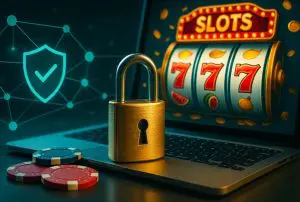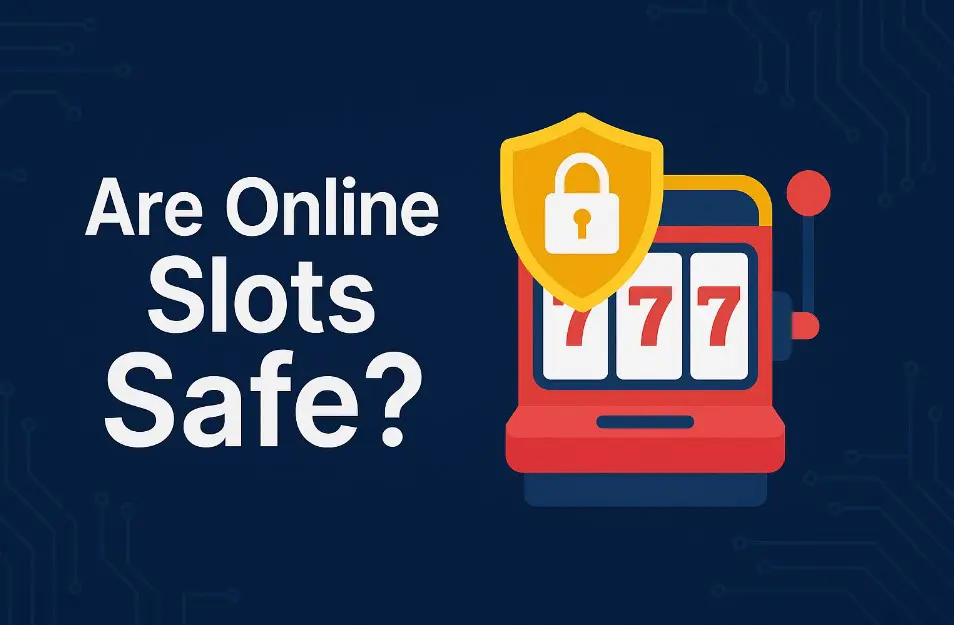There’s something oddly comforting about spinning digital reels late at night, coffee (or let’s be honest, maybe wine) in hand, watching those little icons line up. But amid the flashing lights and bonus sounds, one thought creeps in for a lot of people: is this actually safe? You’re sending money somewhere into the digital void—so what’s really happening behind the curtain?
The short version: yes, online slots can be very safe—if you play on legitimate, licensed platforms. But the long version, the one that actually matters, involves encryption, verification, fraud prevention, and a pinch of common sense. So let’s unpack how online casinos keep you secure and how to avoid the digital equivalent of a shady backroom slot machine.
Are Online Slots Actually Safe?
Here’s the thing—slots themselves aren’t dangerous. The reels don’t have secret backdoors or hidden algorithms waiting to steal your data. The real risk lies in where you play. I’ve seen players jump on unknown casino sites just because they offered 200 free spins, only to realize later that “free” came with a catch.
Legitimate casinos go through constant security audits. Regulators like the Malta Gaming Authority or UK Gambling Commission test every random number generator (RNG) used in slots to ensure outcomes are truly random. That means even if you’re on a losing streak that feels cursed, it’s not because the system’s rigged—it’s just probability doing its thing.
Casinos that cheat don’t last long. Regulators shut them down faster than you can say “jackpot.” So the secret? Stick with the big names and licensed platforms, not the ones that look like they were coded in someone’s basement.
Encryption: The Invisible Shield Around Your Data
You know that little padlock icon next to a website address? That’s your silent bodyguard—SSL encryption. When you log in, deposit money, or withdraw winnings, SSL (Secure Socket Layer) scrambles your information into code that even the most determined hacker couldn’t read without a supercomputer.
The good ones use 256-bit encryption—basically the same level of protection that banks use. You could sit there for centuries trying to crack it. Some casinos even go further with TLS (Transport Layer Security), which keeps your data encrypted every millisecond it travels from your screen to their server.
So no, nobody’s watching your card details fly through cyberspace in plain text. The reputable sites have that part locked down tighter than your phone when your ex tries to snoop.
Secure Payment Gateways: Where the Real Money Magic Happens
Depositing money online always feels like that moment before you hit “Submit” on a risky text—you hesitate. But secure payment gateways make it far less nerve-wracking.
Casinos partner with well-known payment processors like Visa, Mastercard, PayPal, and Skrill, all of which use top-tier fraud detection systems. These gateways act like airport security: scanning every transaction for suspicious behavior, flagging anything unusual, and blocking potential fraud before it lands.
You might notice casinos showing off logos like PCI DSS Compliant—that’s industry code for “we follow bank-level security standards.” If a casino doesn’t show recognizable payment methods or asks for weird transfers (like sending Bitcoin to a personal wallet)? Big red flag. Run.
Firewalls: The Digital Bouncers
Think of firewalls as the casino’s doormen. They decide who gets in and who gets booted out. Behind the sleek casino interface are layers of protection that block hacking attempts, malware, and bot traffic trying to sneak through.
Some casinos even use real-time monitoring—teams that literally watch for suspicious logins or weird server activity 24/7. If you’ve ever been kicked out of a site mid-spin and thought, “What was that?” there’s a chance the system was just doing a quick reset to keep everyone safe.
No one really thinks about these digital “bouncers,” but they’re why reputable casinos stay online and rogue ones vanish overnight.
Two-Factor Authentication: The Extra Security Step That’s Actually Worth It
I used to roll my eyes every time a site asked me for two-factor authentication (2FA). But then a friend’s casino account got hacked because his password was “Lucky777.” That story ended with someone else cashing out his winnings. Brutal lesson learned.
2FA adds a second step—usually a code sent to your phone or email—before anyone can log in. It’s a five-second hassle that prevents a world of pain. Casinos that offer 2FA care about security; casinos that don’t are basically leaving the back door open. Always switch it on. Always.
KYC Verification: The Awkward but Necessary Step
Let’s be honest: sending in a photo of your ID or utility bill to a casino can feel weird. Like, why do they need to know my electricity provider to give me my winnings? But KYC (Know Your Customer) is one of the strongest tools against fraud and money laundering.
It proves that you’re a real person, of legal gambling age, and that your money isn’t coming from shady sources. Casinos use encrypted document verification systems—some even with facial recognition—to process this stuff securely.
Yeah, it’s a little annoying. But that 24-hour delay before your first withdrawal? That’s the casino making sure your identity is locked in and no one’s pretending to be you.
Common Threats: The Bad Guys of the Internet Casino World
There’s always someone trying to mess with a good thing. Online slots security faces a few recurring villains:
- Phishing Sites – The copycats. They look like your favorite casino, but the moment you log in, your details are gone. Always check that “HTTPS” in the URL.
- Fake Apps – Downloaded a casino app from a sketchy website? You might be installing malware disguised as a jackpot machine.
- Unlicensed Casinos – These are the Wild West of online gambling. No oversight, no regulations, no guarantees. They’ll vanish with your deposit.
- Public Wi-Fi Risks – Free Wi-Fi might save your data plan, but it also lets hackers eavesdrop. Don’t log into your casino account from a café’s network.
If an offer looks too good to be true—like “Get 500 free spins with no deposit and instant withdrawal!”—yeah, it probably is. The legitimate casinos don’t need gimmicks like that. They rely on trust, not trickery.
Spotting a Trustworthy Online Casino
 There’s an art to recognizing a legit casino. Once you’ve seen enough, it becomes instinct. Real casinos are proud of their credentials—they’ll display them openly at the bottom of the homepage.
There’s an art to recognizing a legit casino. Once you’ve seen enough, it becomes instinct. Real casinos are proud of their credentials—they’ll display them openly at the bottom of the homepage.
Look for names like UKGC, MGA, or Curacao eGaming. These regulators require casinos to prove they’re using certified RNGs and following responsible gambling laws.
You’ll also see certifications like eCOGRA or iTech Labs, meaning independent agencies tested the games for fairness. If a casino hides its license or buries its terms in fine print that looks like it was written by a robot lawyer, walk away. Fast.
And one small tip: trustworthy casinos never rush you to deposit. Scammers always do.
Responsible Gambling Tools: The Human Side of Safety
Not all safety is technical. Some of it’s emotional. Real talk—online slots can be thrilling, addictive even. That’s why responsible casinos build tools to keep you grounded.
You can usually set deposit limits, take “cooling-off” breaks, or even self-exclude for a while if you need to. Some sites show pop-up reminders like, “You’ve been playing for 60 minutes,” which can feel mildly annoying—but they work.
One of my friends uses the loss-limit tool religiously. He jokes that it’s like having a digital friend who knows when to grab his shoulder and say, “Alright, that’s enough for tonight.” It’s not a buzzkill; it’s balance.
Casinos that offer these features—and partner with groups like GamCare or BeGambleAware—aren’t just protecting profits. They’re protecting players.
How to Stay Personally Safe While Playing
Casinos do a lot, but you’ve got some responsibility too. Think of it as teamwork—your common sense plus their cybersecurity equals peace of mind. A quick checklist helps:
- Use strong, unique passwords. No birthdays or “Lucky123.”
- Turn on two-factor authentication.
- Don’t play over public Wi-Fi.
- Review your casino transaction history every so often.
- Stick with casinos that publish licensing info and use SSL.
Security doesn’t have to kill the fun—it just keeps the fun from turning into frustration.
Enjoying Slots Without the Worry
Online slots should be fun, not a source of anxiety. When you play on a secure, licensed casino with encryption, proper payment gateways, and clear verification systems, the risks drop dramatically.
Honestly, the online gambling world is far more secure now than it was even five years ago. Between SSL encryption, 2FA, KYC, and strict regulations, you’re safer spinning reels than shopping on some random e-commerce site.
So next time you’re about to chase that bonus round, take a second to notice all the quiet tech keeping you safe behind the scenes. It’s like having a team of invisible security guards working just so you can enjoy your moment of digital luck—and maybe, just maybe, that long-awaited jackpot.


